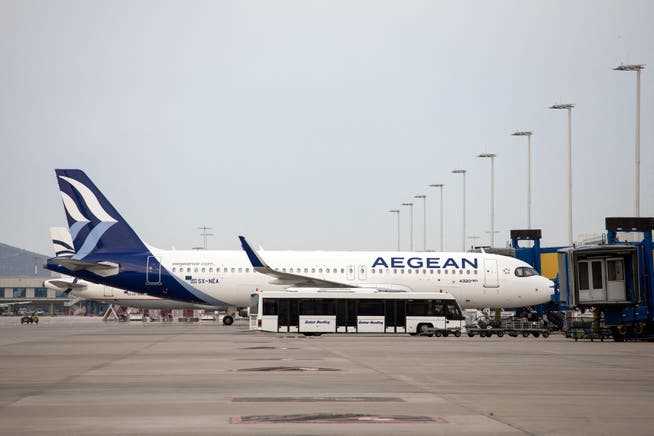Wintershall is planning a major hydrogen project in Wilhelmshaven
(dpa) The gas and oil group Wintershall Dea wants to produce environmentally friendly hydrogen from Norwegian natural gas at the Wilhelmshaven site. As part of the major BlueHyNow project, more than 200,000 cubic meters of hydrogen per hour are to be produced, as the company announced on Thursday (5 May). This corresponds to an annual volume of 5.6 terawatt hours (TWh) and roughly three times the energy consumption of the Volkswagen plant in Wolfsburg in 2019. According to the current planning status, BlueHyNow is scheduled to go into operation at the end of 2028.
The hydrogen produced is to be fed into the pipeline transport network and delivered to industrial customers. Together with other partners, Wintershall Dea intends to invest more than one billion euros in the project. Concrete talks are already being held with potential partners. It is planned to use the carbon dioxide (CO2) from Wilhelmshaven by sea to storage sites in Norway and Denmark and to store them underground there.
«Our project stands for progress. For Germany’s net-zero emissions targets, for the competitiveness of German industry and for a secure, flexible energy supply,” said Wintershall Dea CEO Mario Mehren. He referred to current forecasts, according to which the annual hydrogen requirement in Germany will increase from 55 TWh today to 90 to 110 TWh by 2030.
Federal Economics Minister Robert Habeck (Greens) is expected in Wilhelmshaven on Thursday, where the first floating terminal for liquefied natural gas (LNG) is scheduled to go into operation before the end of this year. Together with Lower Saxony’s Environment Minister Olaf Lies (SPD), he also wants to sign agreements on expanding Wilhelmshaven into a hub for clean energy in Germany.
Ebay with weak figures – disappointing business outlook
Ebay cannot continue the positive trend as a result of the corona pandemic and is disappointing with the latest figures (photo from July 13, 2021).
(dpa) After the internet shopping boom during the corona pandemic, business on the online trading platform Ebay is much worse. In the first quarter, revenues fell by six percent compared to the previous year to 2.5 billion dollars (2.43 billion francs), as eBay announced on Wednesday after the US market closed. Profits fell 16 percent to $625 million.
The outlook for the current quarter was also poor. Ebay expects sales to fall further to between $2.35 billion and $2.4 billion, falling short of analyst forecasts. The stock was down around 6 percent in after-hours trading.
Report: Water scarcity underestimated by financial institutions
(dpa) According to a recent analysis, assets amounting to 13.5 billion dollars (around 12.85 billion Swiss francs) have already been lost due to the global scarcity and pollution of water. More than 2 billion dollars (around 1.95 billion Swiss francs) from investments in particularly water-intensive sectors such as oil, gas, coal or mining are also at risk of literally being “stranded”, according to an evaluation published on Thursday by the Carbon Disclosure Project ( CDP) based in London. The organization systematically collects data and information from companies, banks and other institutions in order to evaluate their climate goals and economic activities.
According to the Carbon Disclosure Project’s analysis of data from 2020 and 2021, around a third of financial companies said that water uncertainty has not played a role in their investment decisions so far. Reasons for depreciation in water-intensive industries include changing regulations on water use, high levels of pollution or local resistance to some projects.
Cate Lamb, CDP’s water insecurity director, said in a statement: “Financial institutions need to understand their exposure to these risks and take immediate action before it’s too late.” For far too long it has been assumed that water will always be in abundance. “This way of thinking has pushed many of the world’s freshwater resources to their limits.”
According to the United Nations, more than 2.3 billion people already live in countries affected by water scarcity. Experts assume that the problem will continue to worsen in view of climate change and increasing demand.
According to the report, projects that have seeped into large investments include the Keystone oil pipeline in Canada, which has already written off $6 billion, according to the CDP. A gold mine on the border of Chile and Argentina also lost $7.5 billion.
Airbus is turning up the heat on A320neo production
(dpa) The world’s largest aircraft manufacturer, Airbus, is expanding the production of its popular medium-haul jets even further. In 2025, 75 machines from the A320neo model family are to leave the Airbus works every month, as the Dax group announced on Wednesday evening (May 4th) in Toulouse. That is more than ever before and a quarter more than before the Corona pandemic. In addition, Airbus surprised with an unexpected profit in the billions in the first quarter. However, not everything is going smoothly for the European manufacturer either: Management postponed the first delivery of the smallest long-haul jet, the A321XLR, to spring 2024.
The news was well received on the financial market in the evening: In after-hours trading on the Tradegate platform, the Airbus share gained almost five percent compared to the Xetra closing price.

An Aegean Airlines A320neo aircraft stands at Athens Airport on May 11, 2020.
While Airbus had significantly reduced aircraft production in the first year of Corona, CEO Guillaume Faury now expects significantly better business again, despite the global upheaval caused by the Russian attack on Ukraine. “For the period after 2022, we see continued strong growth in demand for commercial aircraft,” he said. The main focus here is on the A320 model family, with the new edition of which the European group, the A320neo, snatched the dominance of medium-haul jets from its US rival Boeing a few years ago.
Airbus announced last year that it would ramp up production of the A320neo to a record 65 a month by 2023. Before the pandemic, the rate had been around 60 before Airbus cut it back by a third after the pandemic began. Most recently, between 45 and 50 jets left the Airbus hangar every month. With the recovery of air travel, airlines are now looking to have more new aircraft again. In addition, Airbus is sitting on a thick order book in this segment and has to work off this mountain somehow.
In order to increase production rates, the Airbus Group wants to increase capacity at its existing locations and expand its presence at its plant in Mobile, Alabama. In addition, all commercial aircraft assembly sites are to be given the ability to build the long version A321neo, which is now in particularly high demand.
In the first quarter, Airbus recovered a little further from the Corona crisis. Sales increased year-on-year by 15 percent to 12 billion euros. The operating profit adjusted for special factors (adjusted EBIT) even jumped by 82 percent to almost 1.3 billion euros. A positive effect in connection with the Group’s pension obligations contributed around 400 million euros to this. On the other hand, the Russia sanctions burdened the result with around 200 million euros.
In addition to the business with passenger and cargo aircraft, the helicopter division and the armaments and aerospace business also went up significantly. The bottom line is that Airbus earned 1.2 billion euros across the group, more than three times as much as a year earlier. In addition, the group exceeded the average expectations of analysts.
For the year as a whole, Faury sees the group on course to achieve adjusted operating profit of around 5.5 billion euros as planned. To this end, the group wants to deliver around 720 commercial aircraft to its customers. The lion’s share will go to the A320neo Family. For the time being, production of the A350 and A330neo wide-body jets will remain at the level curtailed by the pandemic.
The A320neo family also includes the long-haul version A321XLR, which the manufacturer actually wanted to deliver for the first time at the end of 2023. But now he has to rework the model. Commissioning is now expected for early 2024 in order to meet the approval conditions, the statement said. However, the first test flight of the type should take place in the current quarter.
